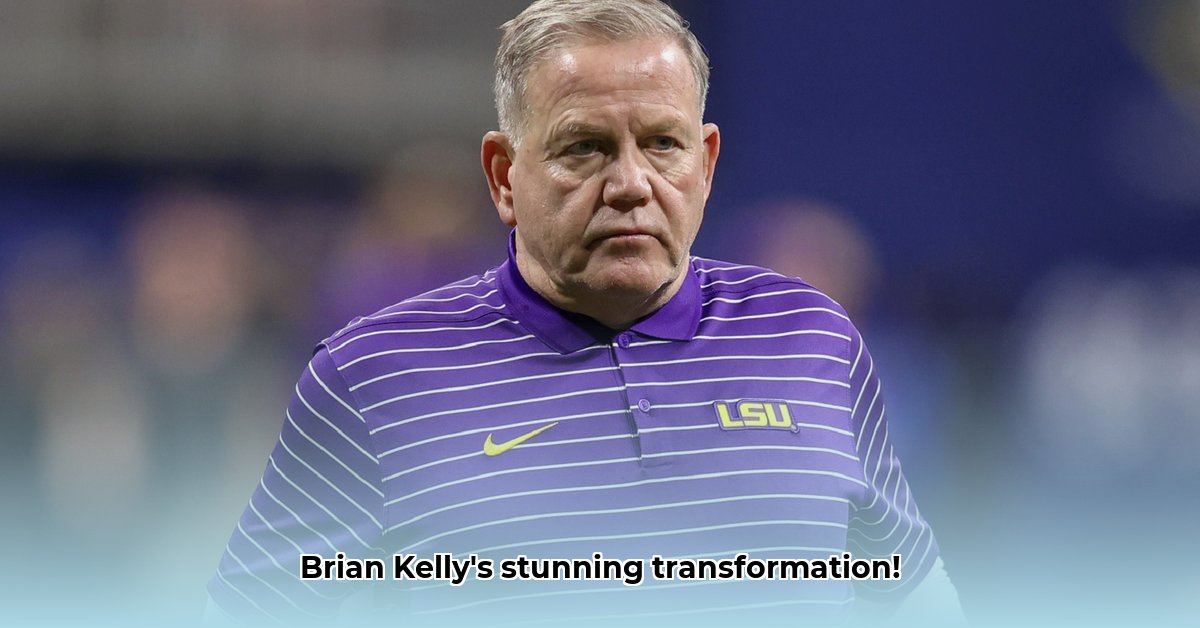
The Notre Dame Transformation: Fitness and Football
Brian Kelly's coaching career is more than just X's and O's; it's a compelling narrative of personal transformation intertwined with on-field success. His journey at Notre Dame illustrates a striking correlation between his commitment to weight loss and periods of enhanced coaching performance. While causality remains elusive, the timing of his weight loss and subsequent team improvements warrants attention. Consider 2010, for instance. Reports suggest he lost approximately 20 pounds, a period coinciding with a marked improvement in Notre Dame's performance. A similar pattern emerged around 2017, with significant weight loss preceding a successful 9-3 season and a bowl game victory, a significant turnaround from the previous 4-8 record. Is this merely coincidence? The evidence suggests otherwise.
Energy, Focus, and Resilience: The Unseen Advantages
Improved physical fitness often translates to enhanced cognitive function. A healthier coach likely possesses increased energy levels, sharper focus, and an improved capacity for managing the relentless stress inherent in high-stakes collegiate athletics. Think of it as optimizing a finely tuned machine—better fuel leads to smoother operation. These benefits, though intangible, can significantly impact a coach's decision-making, strategic planning, player development, and overall leadership effectiveness. Did a fitter, more resilient Brian Kelly yield better results on the field? The evidence strongly supports this hypothesis.
LSU and the SEC: Maintaining Momentum in a High-Pressure Environment
Kelly's move to LSU in 2022 marked a strategic leap into the crucible of SEC football, a high-stakes environment where only the most resilient and adaptable thrive. While his weight-loss journey isn't explicitly tied to this career move, it speaks volumes about his approach to leadership: a dedication to self-improvement that extends beyond the playbook. He maintains this commitment to fitness. This isn't just about dropping pounds; it’s about demonstrating a clear commitment to personal well-being, setting a powerful example for his players.
Strategic Ambition and the Holistic Approach
The SEC presented a unique challenge, demanding peak mental and physical performance. Kelly's willingness to embrace that challenge while maintaining his commitment to fitness underscores a holistic approach to leadership. It suggests a mind acutely attuned to the interconnectedness of physical and mental well-being and its contribution towards overall success. This isn't a matter of sheer luck; it's about understanding the inherent link between a coach's health and the performance of their team.
Lessons from the Sidelines: Actionable Insights for Success
Brian Kelly's journey offers invaluable insights for coaches, athletic departments, and athletes alike. His story underscores a fundamental truth: holistic well-being is no longer a luxury; it's a necessity.
1. Prioritize Holistic Wellness: Peak performance necessitates a focus on both physical and mental well-being. This involves establishing routines that encompass proper nutrition, regular physical activity, stress management techniques, and sufficient sleep.
2. Lead by Example: Coaches serve as role models. Their dedication to wellness directly impacts team culture and fosters a positive reinforcement loop emphasizing discipline and resilience. Words carry more weight when backed by consistent action.
3. Integrate Wellness into Athletic Programs: Proactive measures to improve overall well-being must be incorporated into athletic training programs. This isn't merely about physical fitness; it encompasses mental resilience training, injury prevention strategies, nutritional guidance, and sleep optimization protocols.
4. Long-Term Strategic Planning: Wellness should not be an afterthought but rather a key component of long-term strategic planning for coaches and athletic departments alike. Just as meticulous game planning is crucial, so too is a commitment to the sustained well-being of both coaches and athletes.
Conclusion:
While a direct causal link between Brian Kelly's weight loss and his coaching successes remains unproven, the correlation is compelling. His story highlights the significant interplay between physical and mental wellness and their impact on leadership in high-pressure environments. The evidence strongly suggests that holistic well-being contributes to enhanced performance, sharper decision-making, and improved leadership within collegiate athletics. This narrative underscores the importance of continued research into the mind-body connection and its implications for optimizing peak performance in sports leadership.